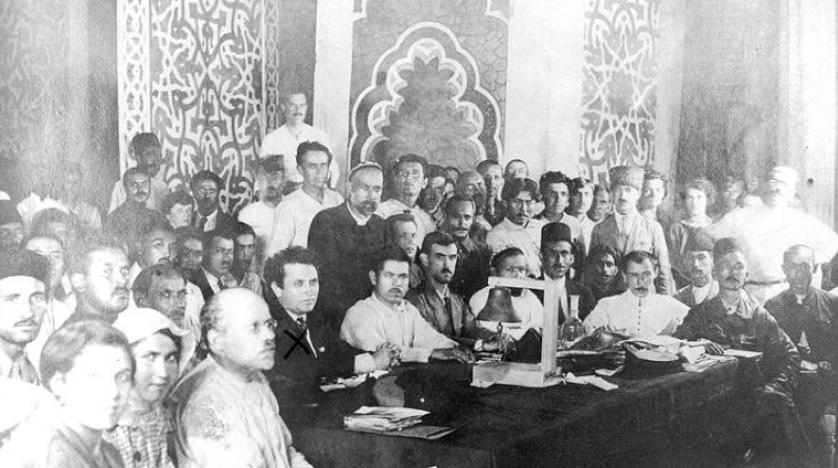London- “Set the East ablaze!” This was the brief order that the leader of the Bolshevik revolution Vladimir Ilycyh Ulianov, alias Lenin, gave to Zinoviev when he sent him on a mission to mobilize the Muslim subjects of the Russian Empire in support of the October Revolution.
Zinoviev was the party name of Ovseï-Gerchen Aronovitch Radomyslski-Apfelbaum, a Ukrainian Jewish intellectual who had spent years in exile in Europe and had almost no knowledge of the “wild frontiers” of Central Asia and the Caucasus where the Tsar’s Muslim subjects lived. Used to café discussions with Westernized intellectuals, Zinoviev failed to establish any rapport with Muslim tribes of the regions concerned and antagonized the religious leadership in Central Asia and the Caucasus by advancing the slogan: “You believe either in God or in Revolution!”
Having failed to set the Muslim East ablaze, Zinoviev was transferred back to the center to lead the Communist International (COMINTERN) with the task of seizing control of Socialist and Social-Democrat parties in Europe, a mission which he performed with great efficiency before Stalin, emerging as sole dictator after Lenin’s death, put Zinoviev and many other top Bolsheviks to death on charges of treason.
Having learned from Zinoviev’s experience with Muslims of Russia, Lenin decided that “education and persuasion” wouldn’t do the trick among people firmly attached to their religion and traditional way of life. His next emissary was Mikhail Frunze who was determined to win Russia’s Muslims over by force rather than persuasion. When Kazakh, Kyrgyz, Qarapakh and Uzbek tribes rebelled against the new Bolshevik regime, Frunze didn’t ask for more ideological instructors. He demanded more guns and aircraft to bomb the rebels. Lenin cabled him succinctly: “Shoot their men, seize their animals, drive their women and children across the border!”
Frunze did that with extra zeal, writing one of the darkest chapters of Soviet history, known by Central Asians as “The Autumn of Sorrows.” Frunze died a year after Lenin, before Stalin had a chance to also kill him.
However, the Bolshevik Revolution did have some genuine supporters among a small number of Westernized Muslim intellectuals in the Caucasus and central Asia.
The best known among them was Sultan Aliev, a Tatar who came to be known as “The Muslim Lenin”. A brilliant and charismatic propagandist Aliev, or in Russian Galiev, enjoyed much prestige with the Bolshevik leadership to the point that he was one of those who carried Lenin’s coffin. Aliev wanted a straight Communist revolution in the Muslim lands of the Russian Empire. His teachings inspired such events as “the burning of burqahs” and the mass shaving of beards in Tatar, Bashkir and Uzbek territories.
Other Muslim intellectuals searched for ways of producing a version of Communism that could be reconciled with at least some aspects of traditional Islamic teachings. They emphasised the importance of education, equality for men and woman, and acceptance of intellectual diversity. The most brilliant among them were Sadreddin Ayni, Ahmad Danesh and Abdul-Rauf Fitrat.
The Bolshevik Revolution’s full effect on the Muslim world took several decades to materialize with the creation of Communist parties in Iran, Turkey and several Arab countries. By the 1950s, Communism had become an important, and fashionable part of political and intellectual life in the Middle East and among the Muslims in the Indian Subcontinent and Indonesia.
The Communist word view in general and Leninist methods of organization and agitation, was adopted by many Islamist activists who regarded Communism as a form of “kufr”(infidelity). In Egypt, Hassan al-Banna, the teacher who founded the Muslim Brotherhood, admitted he had learned much from Lenin’s modus operandi. Sayyed Qutb, the chief theoretician of the Brotherhood, modelled his book “Signposts” on Lenin’s “What Is To be Done?” The Pakistani religious-political leader al-Maudoodi said he had no objection to being regarded as a pupil of Lenin “when it comes to the role of an organized vanguard to reshape society.”
Ayatollah Ali Khamenei, the current Iranian “Supreme Guide” is also a not so secret admirer of Lenin. In a strange choice of timing, in a talk last month, Khamenei repeated Lenin’s parable of the mountain climbers almost word for word.
On a wide scale, however, the Muslim world proved inhospitable to Communism as governments crushed its adepts and people shunned them.
